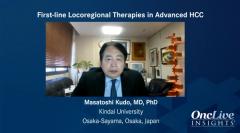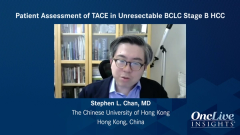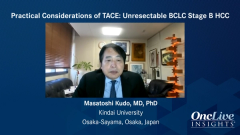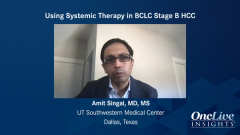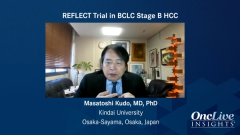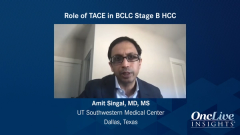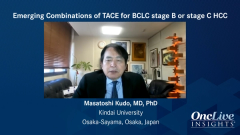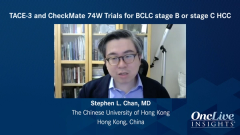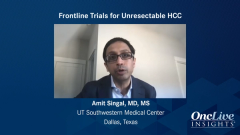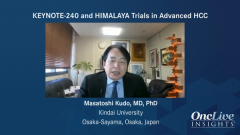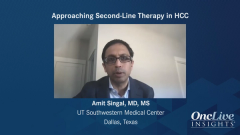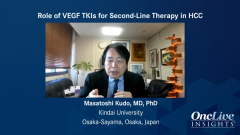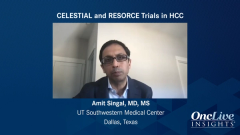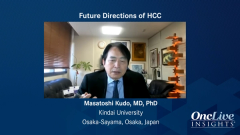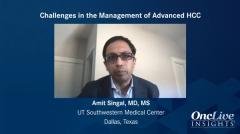
Frontline Trials for Unresectable HCC
Amit Singal, MD, MS, and Stephen L. Chan, MD, review the IMbrave150, LEAP-002, and CheckMate 9DW trials for unresectable hepatocellular carcinoma.
Episodes in this series

Amit Singal, MD, MS: IMbrave150 is clearly a landmark trial that changes our approach to systemic therapy for patients with advanced-stage HCC [hepatocellular carcinoma]. It definitively transitions from TKI [tyrosine kinase inhibitor] therapy to immune checkpoint inhibitor therapy being considered frontline therapy for patients with advanced-stage HCC. In the New England Journal of Medicine article, we saw atezolizumab-bevacizumab giving significantly better overall survival and progression-free survival compared with sorafenib at the first interim analysis. However, at the time of that interim analysis, 1 of the things that was unfortunate was that we had not reached median survival. When we talk to our patients in clinical practice, this is 1 of the questions that often comes up: “This is great that we have a new therapy, but what’s my expected survival?”
At ASCO GI [American Society of Clinical Oncology Gastrointestinal Cancers Symposium] we saw updated results of the IMbrave150 study, and this really provides 2 important data points in my mind. The first is that we now have a data point for the expected median survival for atezolizumab-bevacizumab in the frontline setting. This sets the benchmark for what we should consider median overall survival with systemic therapy in the frontline setting. This is a data point we can use with our patients moving forward in our clinic when patients ask for the expected survival.
The other important data point that this updated survival provides is that we see continued separation of the curves. When we see a trial report out and shows a benefit at the first interim analysis, there’s always the possibility that the effect of that superior therapy could be overestimated, and then with longer follow-up these curves could start to come together. But we do not see that in updated results of IMbrave150. These curves remain separated, and the mitigation in the improved survival and improved progression-free survival, that mitigation is minimal if any. Once again, it’s nice to know that atezolizumab-bevacizumab continues to provide a survival benefit even over longer follow-up for these patients with advanced-stage HCC.
Now that we’ve had atezolizumab-bevacizumab approved in the frontline setting, it’s an exciting time because this is just the beginning of the advances that we’re going to be seeing in the frontline systemic therapy space. We have multiple other trials that we expect to report out over the next 1 to 2 years. We have data that we expect to come out, for example, lenvatinib and pembrolizumab in the frontline setting, durvalumab-tremelimumab, nivolumab-ipilimumab. These trials are all expected to report out shortly.
At ASCO GI, we saw data updated in terms of nivolumab-ipilimumab. These were data from the CheckMate040 study in terms of the phase 2 data showing safety and promising survival estimates from nivolumab-ipilimumab in terms of patients with advanced-stage HCC. This is being evaluated in a large, randomized, controlled trial vs sorafenib in the frontline setting. When you look at the safety estimates, as well as the survival preliminary data, all of us are hopeful that nivolumab-ipilimumab—this CheckMate 9DW study—will be positive and will be another option in the frontline setting shortly.
Stephen L. Chan, MD: For the combination of pembrolizumab and lenvatinib, there were encouraging phase 1b data reporting on these combinations at ASCO last year. Particularly in the data when they look at the use of these combinations, in around 100 patients, the response rate—especially about modified RECIST—is a little high, with over 14% of patients achieving a partial response or a CR [complete response], according to the modified RECIST. Also, the overall survival is more than 20 months and the progression-free survival is around 9 months. Although they do observe higher grade 3 toxicity related to this combination in around 60% of patients, there are no new signals beyond the toxicity profile. Therefore, a lot of people are quite enthusiastic about this data.
In fact, the FDA has also given a breakthrough designation to the development of these combinations. However, when the company tried to apply for accelerated approval for this combination for the first-line use, the FDA rejected it and preferred to wait for more mature data. One of the reasons is because of the lack of the control arm in this phase 1b study. People cannot accurately gauge the magnitude of the benefit of the addition of pembrolizumab to the lenvatinib.
This makes the LEAP-002 study very important. It’s a phase 3 clinical trial comparing the pembrolizumab plus the lenvatinib. The dosage of the pembrolizumab is 200 mg every 3 weeks, while the lenvatinib is the same as this monotherapy use: 12 mg for people higher than 60 kg or 8 mg for those people with a body weight lower than 60 kg, daily. The control arm of this study is also the lenvatinib. The primary end point of this study is the progression-free survival and the overall survival, so there will be a coprimary end point. In fact, this study has completed accrual. The investigator is waiting for the maturation of the overall survival to wait for the results. This result will be very important to help answer the question of whether the addition of the pembrolizumab to the lenvatinib is much better than the lenvatinib. Hopefully in the future we can see the results.
Transcript Edited for Clarity


